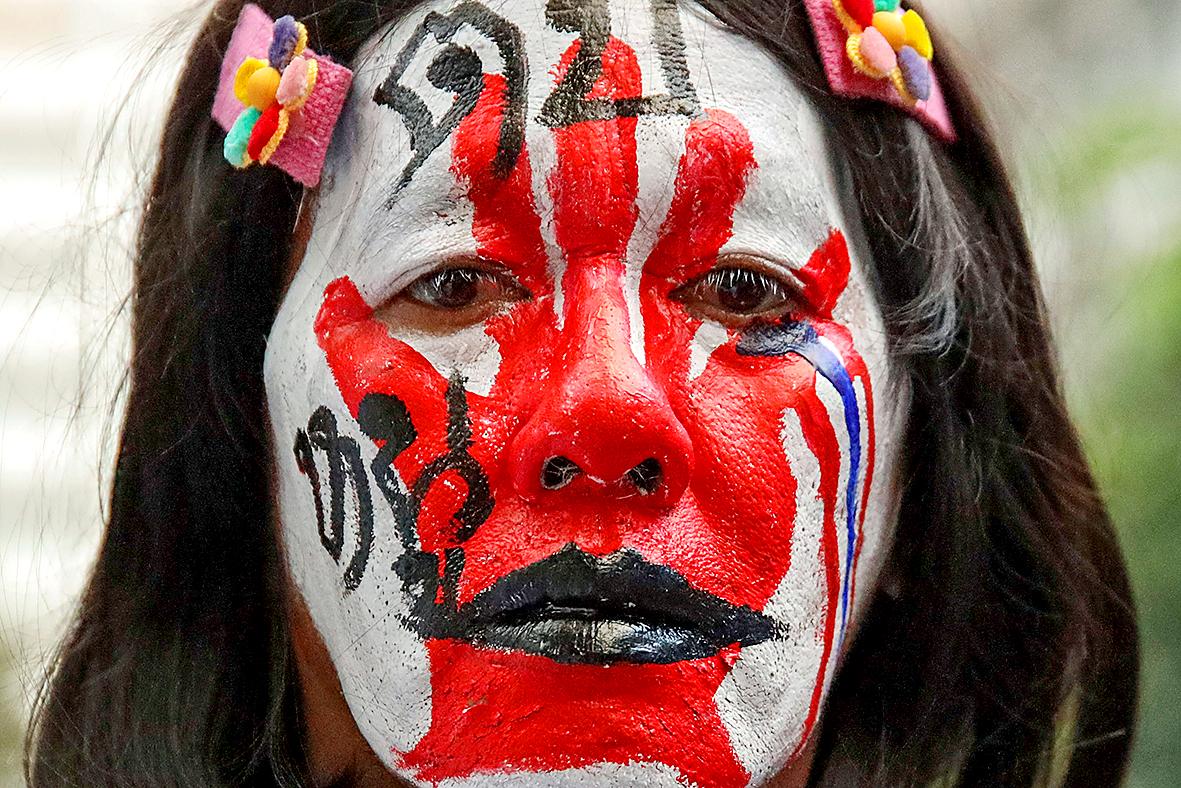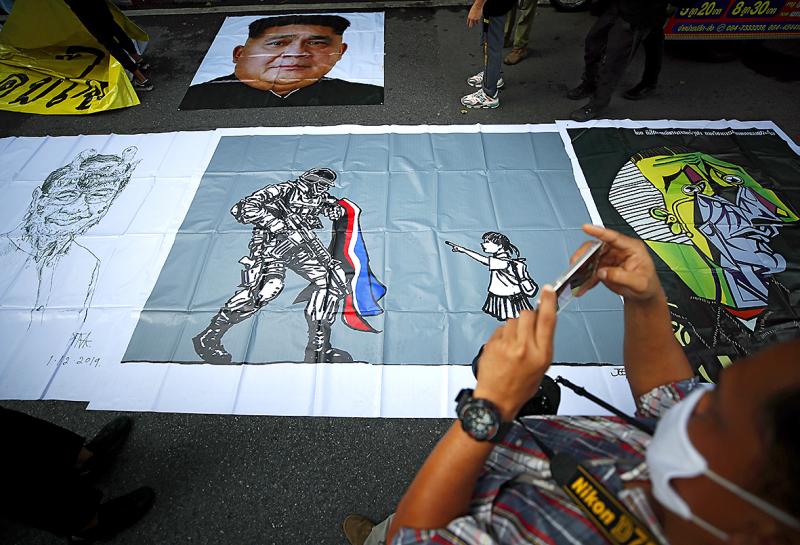From raising hundreds of thousands of dollars for Thai protesters to inspiring the youths who join demonstrations through dances and social media, K-pop fans have emerged as a potent political force in Thailand’s anti-government movement.
Earlier this year, K-pop fans in the US surprised many people by using their social media power to raise funds for Black Lives Matter and to sabotage a re-election rally for President Donald Trump.
But in Thailand they have been part of the youth culture for a long time, and their support for the protest movement reflects the frustrations of a generation that is unhappy with the government using the power of the state to stifle dissent.

Photo: Reuters
“K-pop fans would love to just fangirl over our ‘oppas’ and care about nothing else, but with our country like this, we as citizens have to call for better things,” said Suphinchaya, 23, using the term of endearment for male K-pop artists.
Like many Thai protesters she declined to give her full name because of the sensitivity of the issue.
Young, mostly female, and social media-savvy, the profile of K-pop fans matches that of many protesters, said Chayanit Choedthammatorn, a Thai researcher of Korean studies.

Photo: EPA-EFE
“Although they are K-pop fans, they are Thai citizens first,” she said.
The greatest spur to action was an Oct. 16 crackdown when police used water cannon to disperse protesters who had defied a ban aimed at ending protests against Prime Minister Prayuth Chan-ocha, a former army chief, and to demand curbs on the monarchy’s power.
Far from the scene, Areeya started a Twitter poll from her Girls’ Generation fanbase account with over 17,500 followers to see if they would help fund the cause.
Results were overwhelmingly positive, she said, as K-pop fans were no stranger to lightning fundraising campaigns — previously using them to buy billboard ads in public spaces to celebrate their beloved artists’ birthdays or album releases.
“Many people were angered by the crackdown and police violence against unarmed protesters that day. They turned that anger into donation money,” Areeya, 23, said.
In just nine hours, Thai fans of the girl group, who called themselves SONEs, raised more than 780,000 baht (US$25,000), along with other Thai K-pop fandoms that collectively raised more than 4 million baht (US$128,000) that week.
Areeya and her team coordinated purchases of protective equipment such as helmets and goggles, organizing deliveries to protest sites, and recording everything for transparency.
The largest chunk of the donation went to Thai Lawyers for Human Rights, a non-profit group that provided pro bono legal assistance to more than 90 protesters arrested since mid-October.
Thai fans of K-pop’s biggest names such as BTS, Super Junior, EXO, Blackpink and SHINee also mobilized. The artists’ labels, SM Entertainment, Big Hit Entertainment, and YG Entertainment, did not immediately respond to requests for comment.
“We’re proud to support the cause we believe in, in the name of someone we love,” said Jan, 27, who raised more than 700,000 baht (US$22,500) with Super Junior’s fandom E.L.F. in 22 hours.
Thai Lawyers for Human Rights said donations soared.
“We suddenly have more than 10 million baht (US$321,440) in our bank account,” said director Yaowalak Anuphan. “I’m amazed by the K-pop fans.”
On social media, K-pop fan accounts that used to focus on news about their favorite artists have turned political — promoting protest-related hashtags and undermining pro-monarchy hashtags with sarcastic messages and K-pop slang.
The presence of K-pop fans is visible at protests, as activists wave LED signs and light sticks, as they would at K-pop concerts, and hold gold-framed pictures of music idols that parody portraits of Thai royals.
The fans’ knowledge of South Korea’s history and the part pop culture played in recent protests was also a source for inspiration.
Natchapol Chaloeykul, 24, danced at recent protests to the sounds of Into the New World by Girls’ Generation — the song sung at student rallies that led to the impeachment of former South Korean president Park Geun-hye in 2017.
“K-pop fans read up about South Korea, and when we look back on our country, we wonder why we can’t be where they are,” said Natchapol.
“Like in the song, we want new things for our country too.”

In the March 9 edition of the Taipei Times a piece by Ninon Godefroy ran with the headine “The quiet, gentle rhythm of Taiwan.” It started with the line “Taiwan is a small, humble place. There is no Eiffel Tower, no pyramids — no singular attraction that draws the world’s attention.” I laughed out loud at that. This was out of no disrespect for the author or the piece, which made some interesting analogies and good points about how both Din Tai Fung’s and Taiwan Semiconductor Manufacturing Co’s (TSMC, 台積電) meticulous attention to detail and quality are not quite up to

April 21 to April 27 Hsieh Er’s (謝娥) political fortunes were rising fast after she got out of jail and joined the Chinese Nationalist Party (KMT) in December 1945. Not only did she hold key positions in various committees, she was elected the only woman on the Taipei City Council and headed to Nanjing in 1946 as the sole Taiwanese female representative to the National Constituent Assembly. With the support of first lady Soong May-ling (宋美齡), she started the Taipei Women’s Association and Taiwan Provincial Women’s Association, where she

It is one of the more remarkable facts of Taiwan history that it was never occupied or claimed by any of the numerous kingdoms of southern China — Han or otherwise — that lay just across the water from it. None of their brilliant ministers ever discovered that Taiwan was a “core interest” of the state whose annexation was “inevitable.” As Paul Kua notes in an excellent monograph laying out how the Portuguese gave Taiwan the name “Formosa,” the first Europeans to express an interest in occupying Taiwan were the Spanish. Tonio Andrade in his seminal work, How Taiwan Became Chinese,

Mongolian influencer Anudari Daarya looks effortlessly glamorous and carefree in her social media posts — but the classically trained pianist’s road to acceptance as a transgender artist has been anything but easy. She is one of a growing number of Mongolian LGBTQ youth challenging stereotypes and fighting for acceptance through media representation in the socially conservative country. LGBTQ Mongolians often hide their identities from their employers and colleagues for fear of discrimination, with a survey by the non-profit LGBT Centre Mongolia showing that only 20 percent of people felt comfortable coming out at work. Daarya, 25, said she has faced discrimination since she